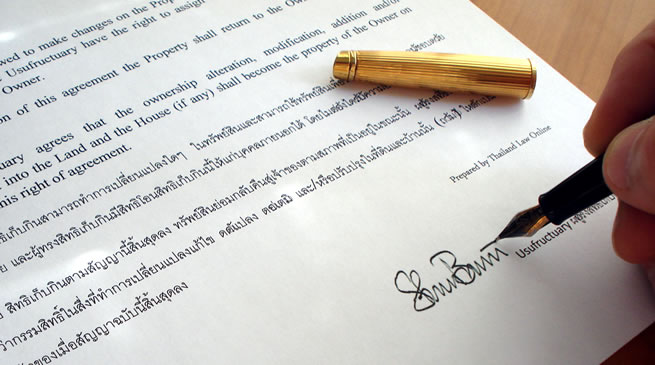Usufruct in Thailand
Real Estate Laws: real property rights for individuals
Foreigners cannot own land in Thailand but they can obtain a right of usufruct by agreement with the Thai owner of the land or land an house. The essence of a right of usufruct is that it transfers the rights of possession, use, enjoyment and management of an immovable property from the owner to the usufructuary.
Usufruct gives the person granted the right of usufruct certain strong rights that are normally associated with ownership of the property, but the usufructuary is not allowed to sell the property nor usufruct nor can he 'consume' the property and he must take as much care of the property as a person of ordinary prudence would take of his own property and upon termination the property must be returned to the owner in the same state. Usufruct is governed by sections 1417 to 1428 civil and commercial code.
Usufruct is terminated upon death
The right of usufruct may be created for a period of time or for the life of a person or persons. The right of usufruct can't be established for a period exceeding the life of a natural person or persons (it can also not be created for the life of an unborn child). When the right of usufruct is granted to a juristic person the period can't exceed a period of 30 years. When the right of usufruct is created for a period of time the usufruct will also depend on the life of the person granted the right of usufruct as the law states that in any case the usufuct comes to an end on the death of the usufructuary. The right of usufruct distinguishes itself in this matter from for example the right of superficies .
Right of management of the property
The usufructuary is allowed to manage the property and has in this matter the similar rights as the owner of a property, it includes the right to rent out the property without the consent of the bare owner. The bare owner is the Thai national who owns the property but does not have the right to use and derive profit from the property, this right is held by the person (foreigner) who holds the right of usufruct. It includes for Thai nationals the right to register the contract for hire exceeding 3 years with the land department, but in case of a foreign national the land offices in Thailand will refuse the registration of the contract for hire on the land title deed (they only accept the Thai land owner as the landlord or lessor of the property, as foreigners are not allowed to own nor manage land in Thailand). In practice foreigners having a usufruct can rent out the property under usufruct for periods not exceeding 3 years at the time (unless they would be able to register the contract for hire exceeding 3 years with the local land office). When a property under usufruct is rented out by the usufructuary the lease is not automatically terminated together with the end of the usufruct (Scj. 2297/2541). The rental agreement given by the usufructuary can survive the the right of usufruct.
Registration of the right of usufruct
Usufruct can only be created for an immovable property with a full title deed. The usufruct must be made in writng and is only complete (created and enforceable) upon registration of the right of usufruct by the land office (section 1299 civil and commercial code). A usufruct can be granted with or without consideration (as a gift or moral obligation). Usufruct must be registered with the local land office and registration fees are 1% and 0,1% stamp duty over the total consideration, or if the usufruct is granted without the exchange of value (money) the registration will cost less than 100 THB per plot.
Practical use of usufruct
A right of usufruct always depends on the life of the person granted the right of usufruct. Usufruct can’t be sold or transferred (also not by inheritance), and because usufruct can't be sold, and is always terminated upon death, usufruct is for investment purposes not suitable. Usufruct in Thailand is often used by foreigners married in Thailand to a Thai national. It protects the foreign souse's interest in a property in Thailand that is registered on a Thai spouse's name as a personal property. The drawback is that usufruct between husband and wife granted during marriage over the property of the Thai spouse does not offer a full protection in case of a divorce (section 1469 Civil and Commercial Code), but in case of a marriage it is the only suitable right under Thai law that offers the foreign spouse some protection. It could for example be registered to protect the foreign spouse in the event the Thai spouse (owner of the property in Thailand) predeceases the foreigner.
Land office usufruct
Even though our usufruct contracts are in compliance with Thai law and are regularly modified and registered with local authorities, we do not guarantee acceptance and registration by all local land offices in Thailand. Some land office will only accept and register their own standard (short form) usufruct contract.

